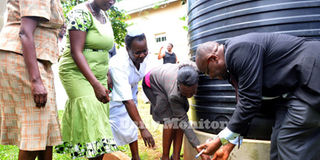How ‘water of life’ has restored health, sanitation

The new outlook of Entebbe Grade B Hospital where underground and on-surface water tanks have been constructed. PHOTOS BY EDGAR BATTE
What you need to know:
For many patients visiting health facilities, poor sanitation is one of the turn-offs they have come to expect. However, that may soon change with the roll-out of a campaign dubbed ‘Water of Life’ that aims at restoring sanitation and health standards at hospitals
As the midday sunshine bounces off the silver iron sheets of Jinja hospital, patients take shade underneath. Metres away, a mother carrying a baby draws water from a water tank.
This is Alice Muwayi’s third child. Thanks to the installment of new water tanks, water to bathe her baby and herself is readily available at the hospital. Hygiene standards have also improved because the availability of water to sanitise the facility.
Uganda Breweries Limited (UBL) has also installed a pump inside the facility to distribute harvested rain water into two 4,000-litre plastic tanks.
At Entebbe Grade B Hospital, the beer company has completed the construction of two underground water harvesting tanks with a combined capacity of 200,000 litres. The tanks will serve an excess of 100,000 people in Wakiso District as part of efforts to help reduce infections among patients and health works.
Another water reservoir harvesting system was constructed at Mbarara Referral Hospital in 2013 while 22 health centres in south-western Uganda received filters to solve the problem of access to clean and safe drinking water for patients who visit the centres every day.
Entebbe hospital’s principal nursing officer, Irene Wesonga, says they will ensure that water reaches different hospital departments such as the maternity wing, theatres, toilets among others.
“Health without water is not health so we need more water at the hospital,” she said.
In Ggaba, modern water-borne sanitation facilities at the fish landing site were built to enable hygienic fish handling as well as help operationalise the European Union funded fish handling facility that had been lying idle due to lack of sanitation facilities. The facility is linked to a reservoir tank of 10,000 litres.
Reaching far out
In Lamwo District in northern Uganda, residents struggled to get access to clean water. When Francis Mabonga was contracted by UBL to set up borehole water sources, residents were glad that they would finally draw water from a clean water source. About 15 others have been built across the country.
Mabonga explains that residents of Lamwo hardly had public water sources and the boreholes provided a relief. The district’s population has steadily grown over the years.
In Busia, the mayor, Michael Mugeni, explains that for a long time, there was a problem of pit latrines at Sofia Market filling up owing to the big number of people that frequented the facility to sell or buy merchandise.
The market has a daily population of about 6,000 people.
This got the municipality’s authorities scratching their heads for answers until new latrines with water closets-enclosed rooms containing toilet bowls for flushing, were constructed.
Mugeni explains that before the water closets, they spent in excess of Shs5 million every month to construct new latrines for the locals using the market.
“This was costly to the municipality. Besides, we did not have a water source in the market. But ever since the water closet was constructed, the hygiene standards have improved,” the mayor observes.
CSR efforts
Under the ‘Water of Life’ project, different hospitals, communities and institutions have received water tanks and boreholes across the country.
UBL director of corporate relations, Charity Kiyemba, explains that the ‘Water of Life’ project was made possible with funding from Diageo and EABL Foundation.
The project was launched in 2006 with a goal to reach 800,000 people by 2015. The project has enabled access to clean and safe water for more than 1,000,000 people across Uganda.
Worldwide, 2.1 billion people have gained access to improved sanitation. Despite the progress, 2.4 billion are still using unimproved sanitation facilities, including 946 million people who are still practicing open defecation.
The project has helped beneficiaries improve access to safe water and sanitation in urban and peri-urban areas in Uganda, according to UBL’s corporate relations executive, Rhona Arinaitwe.
Need for safe water
Speaking at the commissioning of boreholes in Lopulingi, Lamwo, Hilary Onek, the area legislator and minister of Relief, Disaster Preparedness and Refugees, stressed the need for safe water for people in rural areas.
“Safe water supply is a prerequisite for improved health and quality of life of people in rural areas. By providing this lifeline resource, there is reduced incidence of water related diseases and, therefore, improved quality of life and productivity of the rural population,” the legislator said.
More than 75 per cent of the population in Uganda lacks a safe to go to toilet, according to WaterAid, an international organisation whose mission is to improve access to safe water, sanitation and hygiene.
Saving on water bills
But with projects such as ‘Water of Life’ coming on board, these statistics will be lowered. So far, hospitals which have benefitted from the initiative are saving money that would otherwise be used to pay for water.
Dr Moses Muwanga says Entebbe Grade B Hospital saves more than Shs6m every month. He explains that last year, the hospital accrued a water bill amounting to Shs88 million.
“At the moment, the bill is more than Shs150million,” Dr Muwanga reveals, adding that they will be able to pay it back since the consumption of piped water has greatly reduced.
Samuel Waako, Jinja hospital’s senior plumber, explains that since the installation of the water sources, the hospital’s water bill has since reduced by 50 per cent.
“Before tanks were set up, we were receiving an average monthly bill of Shs45million. Today, we pay Shs20m in water bills,” he discloses. He adds that they no longer experience water disconnections.
Additional reporting from Denis Edema, Joseph Kigundu and Rajab Mukombozi




